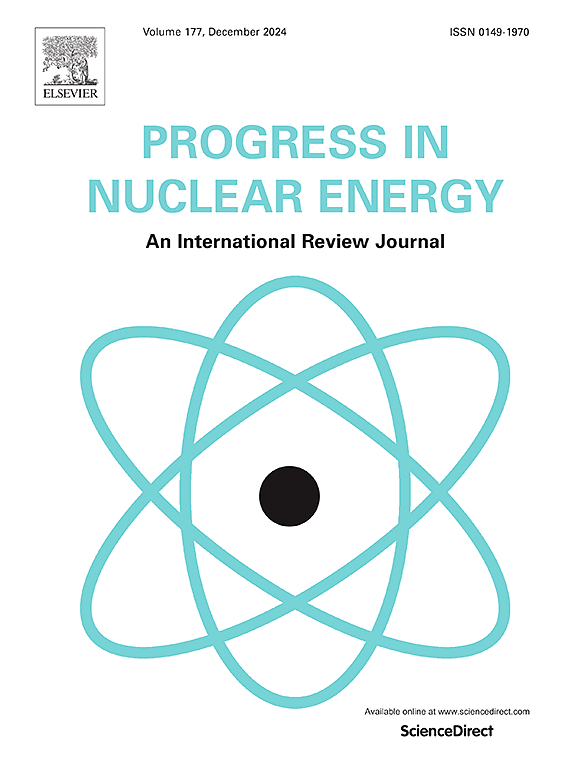Physics-Informed Neural Networks for the safety analysis of nuclear reactors
IF 3.3
3区 工程技术
Q1 NUCLEAR SCIENCE & TECHNOLOGY
引用次数: 0
Abstract
This work explores the development of surrogate models for estimating the evolution of quantities of interest during nuclear reactor accident scenarios. Physics-Informed Neural Networks (PINNs) offer a promising surrogate modelling approach because they allow integrating laws of physics and domain knowledge into traditional Neural Network (NN) surrogates. Specifically, the proposed solution incorporates an additional term in the PINN loss function to enforce physics-based constraints in correspondence of allocation points, which are randomly sampled points whose corresponding target output is not known. As a result, accuracy of the estimation of the quantities of interest and their adherence to the laws of physics are improved. Applications to a synthetic case study and to the response of a nuclear microreactor system during a Loss of Heat Sink scenario confirm that the developed surrogate model based on PINN with allocation points improves the estimation accuracy with respect to other state-of-the-art methods.
核反应堆安全分析的物理信息神经网络
这项工作探讨了替代模型的发展,以估计核反应堆事故情景中感兴趣的数量的演变。物理信息神经网络(pinn)提供了一种很有前途的代理建模方法,因为它们允许将物理定律和领域知识集成到传统的神经网络(NN)代理中。具体来说,所提出的解决方案在PINN损失函数中加入了一个附加项,以在分配点的对应关系中实施基于物理的约束,分配点是随机采样的点,其对应的目标输出是未知的。结果,对感兴趣的量的估计的准确性和它们对物理定律的依从性得到了提高。应用于一个综合案例研究和一个核微反应堆系统在热沉损失情景下的响应证实,与其他最先进的方法相比,基于分配点的PINN开发的替代模型提高了估计精度。
本文章由计算机程序翻译,如有差异,请以英文原文为准。
求助全文
约1分钟内获得全文
求助全文
来源期刊

Progress in Nuclear Energy
工程技术-核科学技术
CiteScore
5.30
自引率
14.80%
发文量
331
审稿时长
3.5 months
期刊介绍:
Progress in Nuclear Energy is an international review journal covering all aspects of nuclear science and engineering. In keeping with the maturity of nuclear power, articles on safety, siting and environmental problems are encouraged, as are those associated with economics and fuel management. However, basic physics and engineering will remain an important aspect of the editorial policy. Articles published are either of a review nature or present new material in more depth. They are aimed at researchers and technically-oriented managers working in the nuclear energy field.
Please note the following:
1) PNE seeks high quality research papers which are medium to long in length. Short research papers should be submitted to the journal Annals in Nuclear Energy.
2) PNE reserves the right to reject papers which are based solely on routine application of computer codes used to produce reactor designs or explain existing reactor phenomena. Such papers, although worthy, are best left as laboratory reports whereas Progress in Nuclear Energy seeks papers of originality, which are archival in nature, in the fields of mathematical and experimental nuclear technology, including fission, fusion (blanket physics, radiation damage), safety, materials aspects, economics, etc.
3) Review papers, which may occasionally be invited, are particularly sought by the journal in these fields.
 求助内容:
求助内容: 应助结果提醒方式:
应助结果提醒方式:


